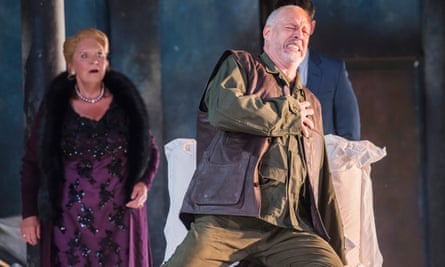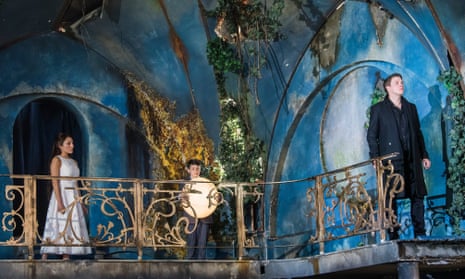We tend to think of Debussy’s symbolist tragedy primarily as a hermetic work, examining half-voiced, festering emotions in an aristocratic world remote from the mundane. But are we right to do so? And if not, then what is the external reality that its protagonists so carefully seek to avoid? These are some of the questions posed by Michael Boyd’s new staging, a striking achievement that blends tradition with innovation to shed fresh light on the opera’s complexities.
Boyd’s approach to the narrative is straightforward, avoiding the psychoanalytic or absurdist glosses that some have foisted on the work of late. Yet at the same time, he opens up its frame of reference. The drama plays itself out not in seclusion, but in a functioning royal court where ritual constricts emotion. Jonathan McGovern’s Pelléas has to kneel in frustrated deference before Brian Bannatyne-Scott’s Arkel, when official permission to visit his dying friend Marcellus is refused. Later, when he sneaks into the garden, tracked by Paul Gay’s Golaud, to watch Andrea Carroll’s Mélisande comb her hair, it’s clear that both men have surreptitiously absented themselves from some grand formal occasion.
Emotion in this hierarchical world is equated with lingering glances that turn increasingly voyeuristic, as Pelléas begins spying on Mélisande through the transparent perspex screens that form the walls of the Wormsley theatre. William Davies’s Yniold, meanwhile, watches everything with uncomprehending curiosity, and his life will eventually be poisoned by what he sees. We are repeatedly told that beyond the decrepit enclosure of Tom Piper’s gothic set, war and famine lurk unseen. The interval comes at the end of the second act, after the lovers have discovered tramps hiding in a grotto by the sea. We leave for supper with the dispossessed looking back at us in telling accusation.

McGovern and Carroll make an entirely credible pair of innocents, whose growing feelings for each other gradually blossom into shy sexual rapture, while Gay negotiates Golaud’s descent into jealously and violence with considerable subtlety. Davies is about as good as it gets as Yniold, and Susan Bickley, wonderful as always, is luxury casting as Geneviève.
Handsomely conducted by Jac van Steen, the Philharmonia are making their Garsington debut. Their playing is glorious, though just occasionally, on the opening night, they threatened to engulf the singers at climactic moments.
- At Garsington Opera, Wormsley, until 7 July. Box office: 01865 361636.

Comments (…)
Sign in or create your Guardian account to join the discussion